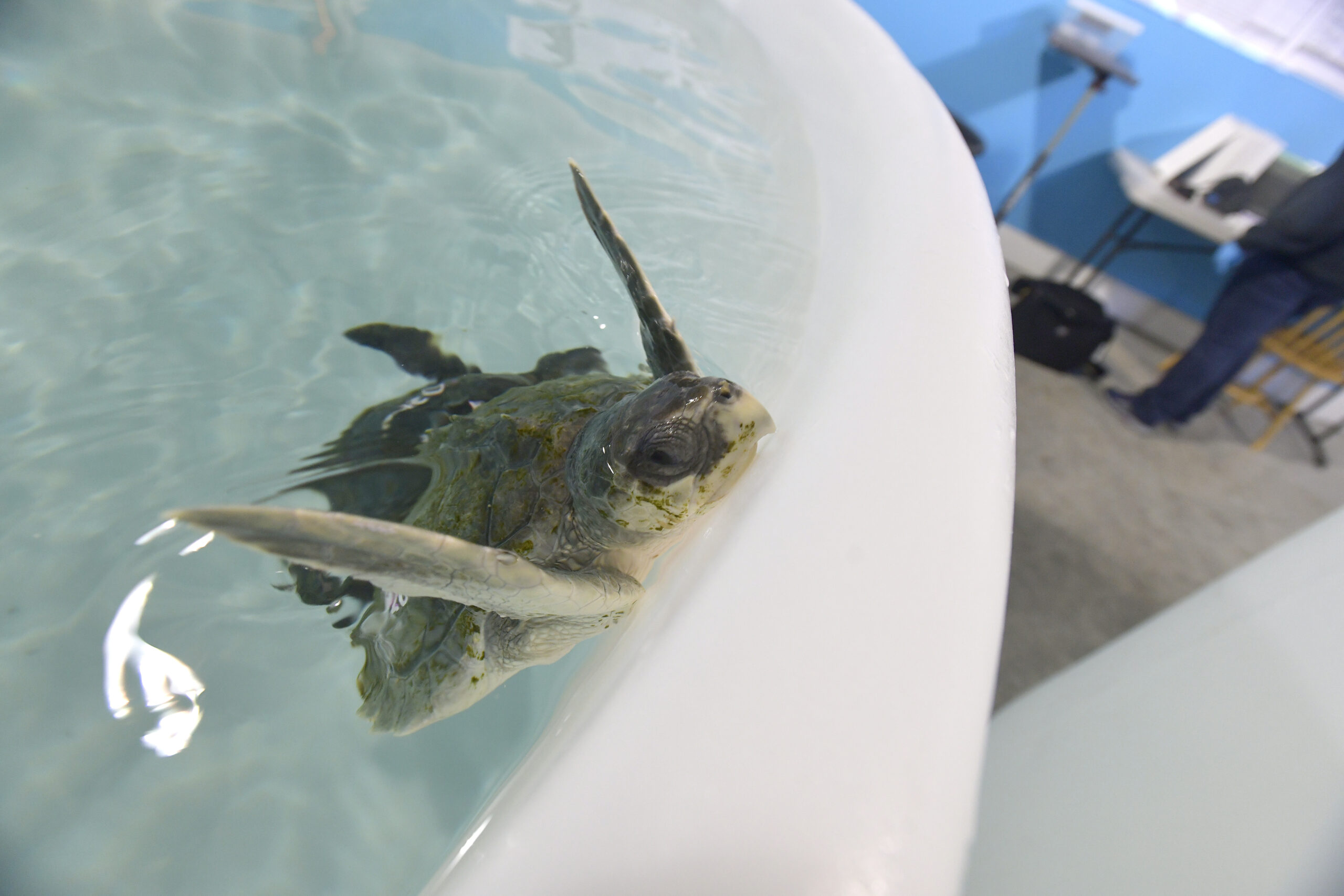
Last Sunday morning, members of the Atlantic Marine Conservation Society picked up 20 banana boxes from Francis S. Gabreski Airport in Westhampton and transported them across the street to their facility.
When they lifted the lids, they didn’t find bunches of yellow fruit.
Instead, the containers were home to 20 cold-stunned Kemp’s ridley sea turtles, rescued from the banks of Cape Cod and shipped to the East End for triage, where they are now on the road to recovery, swimming around the critical care hospital tanks at AMSEAS in Westhampton, according to founder and chief scientist Rob DiGiovanni.
“That’s a good sign,” he said last Monday afternoon. “They’re always considered critical when they first come in, because we have to get them up to speed and eating and all that. It’s basic care to try to get them stabilized from all the transport and moving around, and to try to get them acclimated. Right now, it’s headed in the right direction.”
This particular group, which belongs to the smallest and most endangered species of sea turtles in the world, was stranded throughout the Cape Cod region on November 22, which falls within cold stun season. In the summer and early fall, the turtles commonly enter bays and coastal waters in the Northeast and off the mid-Atlantic, but some appear to stay too long. And when the water temperatures drop below 50 degrees Fahrenheit, cold-blooded turtles that haven’t made their way south to warmer waters become hypothermic, or “cold stunned.”
Initial symptoms include a decreased heart rate and respiration, and lethargy, followed by shock, pneumonia and possibly death. Between 400 and 900 cold-stunned sea turtles strand, both alive and deceased, in the Northeast each year.
“Since the ’80s, we’ve been having reports of cold-stunned turtles coming up. There have been busier years, where they’ve had thousands of animals that have come up on New England,” DiGiovanni said. “There’s been some really, really large peaks. What actually triggers it is something that we’re still trying to get a better understanding on.”
It is unclear whether climate change plays a role, DiGiovanni said, and while research continues on not only the causes, but also why some turtles stay within areas prone to cold-stunning and others migrate into warmer waters, AMSEAS remains involved with the collaborative group effort to save them.
For the third year in a row, the organization has worked with the Specially Trained Animal Response Team, or START, organized by National Oceanic and Atmospheric Administration Fisheries Stranding and Disentanglement Coordinator Kate Sampson.
The mission starts with volunteers from the Massachusetts Audubon’s Wellfleet Bay Wildlife Sanctuary, who walk Cape Cod beaches to collect the cold-stunned turtles. They bring the turtles back to Mass Audubon, where staff checks for signs of life and evaluates the turtles, which then go to the New England Aquarium’s Animal Care Center or the National Marine Life Center — both NOAA Fisheries Sea Turtle Stranding Network members — for an initial evaluation and treatment.
From there, they may be brought to network partners like AMSEAS — transported last weekend to the East End on a flight coordinated by Turtles Fly Too.
“That aircraft actually flew to us and then they flew, I think, to two other facilities down the coast to transport more turtles,” DiGiovanni said.
Over the next couple of days, the AMSEAS team will collect information on the turtles, including blood samples, and encourage feeding on a regular basis. They like high-quality shrimp and crab, DiGiovanni said, and once they put on enough weight, the staff will determine whether they need longer rehabilitation, or are ready to be released into warmer waters.
“Each animal is treated really individually,” he said, “and then when it’s ready to go, we try to move it on down.”
DiGiovanni emphasized that turtle rescue is a group effort — and it starts with the public. In New York, report all stranded marine mammals and sea turtles to the NY Stranding Hotline by calling 631-369-9829. For all other states in the Northeast, call NOAA’s marine mammal and sea turtle stranding hotline at 866-755-6622 to be directed to a trained responder.
“This is a time of the year, for the next couple of weeks, that we can actually see these animals on the beach,” DiGiovanni said. “If you think they’re on the beach, and even if you think they’re dead, just please call them in so that we can get out and see what we need to do.”